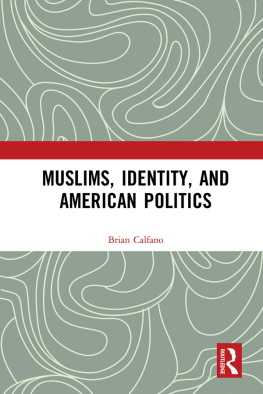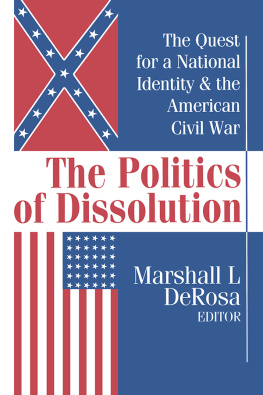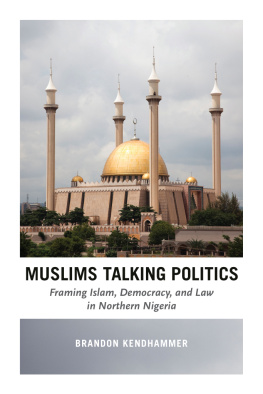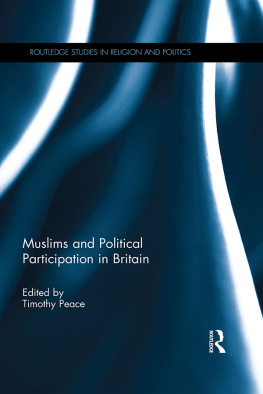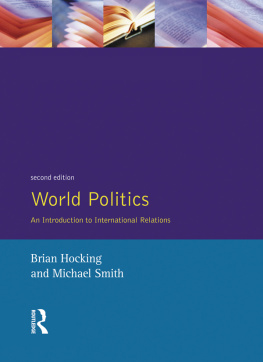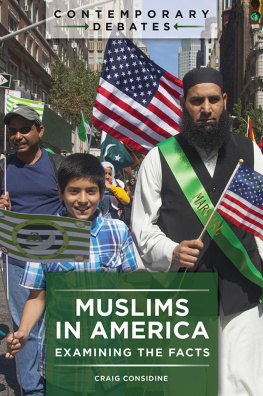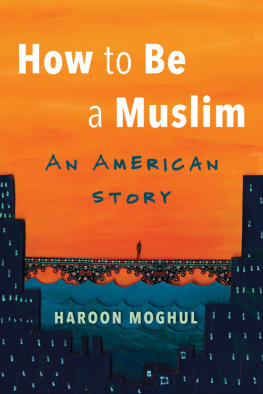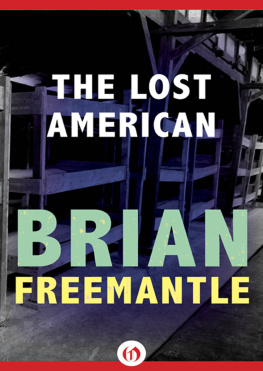Calfanos study provides a thoughtful and nuanced picture of Muslim experiences in the United States. This is a timely contribution to our understanding of Muslim identity formation, with important implications for political attitudes and behavior. An essential read for scholars in the field as well as everyday Americans looking for insight on this understudied community.
Rachel Gillum, Stanford University
Much of our understanding about Islam in the US has come from elites and the media. Calfanos well-written and conceptually sophisticated volume provides us with a better understanding of the consequences that the present-day backlash is having on Muslim Americans. Calfano has produced a masterful and must-read book for religion and politics scholars by refocusing the lens on the experiences of Muslim Americans and providing an examination of their responses to the sociopolitical pressures they face today.
Nazita Lajevardi, Michigan State University, USA
Muslims, Identity, and American Politics
Identity is a complex concept, especially considering the part that group attachments play in affecting how people see their role in their nations political environment. Perhaps the greatest tension in this regard is felt by those who are often considered outsiders in their home country. Despite citizenship and significant ties to their nation, American Muslims face a combination of suspicion, government scrutiny, and social segregation.
This book provides an examination of the pressures faced by Muslims in the United States by exploring how group influence, emotions, and religious interpretation contribute to the political orientation and behavior of national samples of Muslims. It offers a compelling explanation as to how members of an ostracized political group can push through suspicion to become fully engaged political actors.
This book has wide relevance and will be of interest to scholars researching Muslims and political participation across the fields of political science, history, sociology, and religion.
Brian Calfano is Assistant Professor of Political Science and Journalism at the University of Cincinnati. Calfanos fields of specialization are religion and politics, political behavior, media, and marginalized groups. Research interests also include Middle East democratization and human rights in the Organization of the Islamic Conference.
Muslims, Identity, and American Politics
Brian Calfano
First published 2018
by Routledge
2 Park Square, Milton Park, Abingdon, Oxon OX14 4RN
and by Routledge
711 Third Avenue, New York, NY 10017
Routledge is an imprint of the Taylor & Francis Group, an informa business
2018 Brian Calfano
The right of Brian Calfano to be identified as author of this work has been asserted by him in accordance with sections 77 and 78 of the Copyright, Designs and Patents Act 1988.
All rights reserved. No part of this book may be reprinted or reproduced or utilised in any form or by any electronic, mechanical, or other means, now known or hereafter invented, including photocopying and recording, or in any information storage or retrieval system, without permission in writing from the publishers.
Trademark notice: Product or corporate names may be trademarks or registered trademarks, and are used only for identification and explanation without intent to infringe.
British Library Cataloguing in Publication Data
A catalogue record for this book is available from the British Library
Library of Congress Cataloging-in-Publication Data
A catalog record for this book has been requested
ISBN: 978-1-409-42802-2 (hbk)
ISBN: 978-1-315-59709-6 (ebk)
Typeset in Times New Roman
by Keystroke, Neville Lodge, Tettenhall, Wolverhampton
Contents
Surveying Muslim identity
With Casey Ste. Claire
The impetus for this book came around 2008 as Paul Djupe and I were becoming more ensconced in a research program emphasizing the utility of randomized experiments for answering questions about religions impact on political outcomes. Though the work with Djupe was not directly focused on Muslims in the US, it did not take long for me to connect the dots in determining that the Muslim politics literature could benefit from the use of experimental design to address empirical questions about whether and why identity conceptions influence Muslim political opinions and behavior. Over the last eight years I have chipped away at discovering what initial linkages might be present in data collected using research designs intended to capture direct evidence of identity-based influences on Muslims throughout the country.
Of course, the impact of this study became more apparent after the launch of what became Donald Trumps campaign to be president of the United Statesand was even more obvious after he won office. Trumps rhetoric and attempts at discrimination against Muslims are unprecedented for an American politician, and, while most data featured in this book were collected before his candidacy and administration, I take the opportunity throughout the text to look ahead at what the rest of Trumps time in officeand the effect he has on American politics more broadlymight mean for Muslims long into the future.
To be sure, this book stands on some important shoulders. To say that the contribution it makes was aided by the groundbreaking work of Smith, Haddad, Esposito, Jamal, and others is an understatement. My goal with this manuscript is to extend the directions in which future research on Muslims in America might go. I hope that my attempts to wed the study of Muslims in the US with theories of group and individual identity will provide readers with ideas for how a new generation of research on Muslims in the US will conceptualize questions about this heavily scrutinized minority group. As I say throughout the text, the research design choices I made were but a few of many such options that remain available for scholars interested in this and related research questions.
Now I offer a note about those who helped to make this project a reality. Completion of a project of this size requires assistance and guidance from several sources, and I was fortunate enough to have more than my share of both from some very skilled and dedicated people and organizations. Paul Djupe, John Green, Missouri State University, the Muslim Public Affairs Council, and the Council on American-Islamic Relations provided the financial and logistical resources necessary for most of the quantitative data collection featured in the book. I am grateful for Elizabeth Suhays willingness to share her expertise on group and norm-based influences (which became the basis for the experiment in ).
Meanwhile, Mansour Fahimis technical assistance in devising the sampling procedure for the 2009 national CATI survey was invaluable, as was Debbie Davidsons work with the CATI research team at Missouri State University as part of the data collection process. Mohammad Aldhuwayhi helped coordinate the various focus group sessions and mosque-based data collection sessions around the country. Allyse Lofftus and Ian Fitzhenry enabled my progress in analyzing data, and Casey St. Claire proved so indispensable in analyzing the Pew Research Center data that adding his name to was a foregone conclusion long ago. I would also like to thank Alejandro Beutel and Nazita Lajevardi for their friendship and support in providing feedback on various aspects of the manuscript. Finally, I offer my deep gratitude to Natalja Mortensen, Rob Sorsby, and Claire Maloney at Routledge for their patience as I worked through various iterations of this project.


